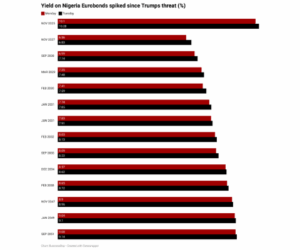The Nigerian Fintech Regulatory Commission Bill, 2025, sponsored by Fuad Laguda, member representing Surulere I Federal Constituency of Lagos State under the All Progressives Congress (APC), passed its second reading during Tuesday’s plenary session and seeks to establish a comprehensive regulatory framework for the sector.
The 124-section bill applies to all related services offered within Nigeria, or provided through any facility or device within its jurisdiction, including those on Nigerian-registered ships and aircraft.
It proposes the creation of the Nigerian Fintech Regulatory Commission, a body empowered to regulate, supervise, license, and enforce standards across the industry.
What the Nigerian Fintech Regulatory Commission will do

The Commission will:
- Ensure that fintech services are available to all citizens on terms that are fair, reasonable, and non-discriminatory.
- Protect the rights and interests of users and operators
- Encourage local and foreign investments, and advance the development of new technologies and services that will support national interests.
- Support the inclusion of elderly citizens and individuals with disabilities in access.
- Have the power to grant, renew, modify, suspend, or revoke licences. No operator will be permitted to provide services without obtaining an appropriate licence. Operating without one is a criminal offence punishable by fines, imprisonment, or both.
- Will operate independently, with authority to sue and be sued.
Additional details about the proposed commission
The bill establishes two main categories of operating permission: individual licences and class licences. The Commission will maintain registers of every licence issued, suspended, revoked, surrendered, or amended.
It will have a governing board consisting of a chairman, a Director-General, executive and non-executive commissioners, and other members appointed by the President, subject to confirmation by the National Assembly.
It will have offices in all geopolitical zones and develop its own staff structure, conditions of service, and administrative systems. It will be funded through appropriations by the National Assembly and other sources, such as fees, charges, fines, and gifts.
The proposed commission is exempt from income taxes.

Read also: How CBN’s Open Banking system will impact Nigerian fintechs: All you need to know
The National Fintech Management Council
The bill provides for a National Fintech Management Council, which will offer advisory input and ensure coordination between the Commission and relevant government bodies.
The composition of this includes the Minister supervising the Commission as Chair, alongside representatives from the Central Bank of Nigeria, the Securities and Exchange Commission.
Others include the Nigerian Communications Commission, the National Information Technology Development Agency, the Nigeria Data Protection Commission, and others with responsibilities in fintech, finance, competition policy, or national digital infrastructure.
Implications for fintech companies
Below is a summary of what this means for fintech companies:
- They must get a licence before operating — no exceptions.
- Tariffs, fees, and charges must be approved first.
- They can be shut down if you ignore the regulator’s instructions.
- All reports and data demanded by the regulator must be supplied accurately and on time.
- Competition practices will be closely monitored – no price-fixing, no market manipulation.
- Customer complaints can now lead to regulatory action.
- Any attempt to hide information, mislead inspectors, or operate secretly can trigger criminal consequences.
Bottom line: Fintech companies will operate in Nigeria only if they follow the Commission’s rulebook, fully and consistently.

Actions that could trigger penalties:
These simple actions could now put a fintech operator in trouble:
- Running a service without a licence
- Changing fees or charges without approval
- Refusing to cooperate with an investigation
- Giving false information to the regulator
- Blocking or threatening the commission’s inspectors
- Hiding or altering records that the regulator requests
- Ignoring licence conditions or compliance rules
Penalties range from fines and licence suspension to equipment seizure and imprisonment. This depends on the seriousness of the violation.








